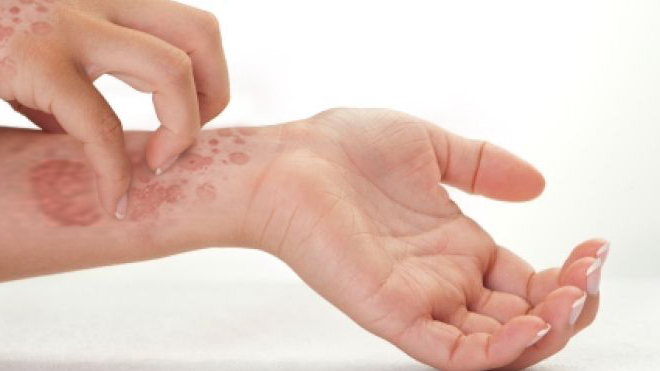 Psoriasis is a skin condition in which the life cycle of the skin cells is accelerated which causes extra skin cells to build rapidly on the skin surface. This leads to red, dry, itchy, scaly skin patches.
Psoriasis is a skin condition in which the life cycle of the skin cells is accelerated which causes extra skin cells to build rapidly on the skin surface. This leads to red, dry, itchy, scaly skin patches.
Treatment for Psoriasis in Modern Medicine:
Local Applications:
Steroid creams aim to slow down the quick growth of the skin cells and reduce inflammation. These creams are quite dramatic in the initial response seen. However, in the long run, it puts you in a vicious cycle of temporary relief, increases in symptoms as soon as the creams are stopped, and subsequent dependency.
Vitamin Analogues / Derivative Creams: Vitamin D analogs which are artificial forms of Vitamin D work by slowing down the skin cell growth. Retinoids are Vitamin A derivatives that aim to normalize the skin cells’ DNA activity. Sunscreen is a must while using a Retinoid cream to combat the increased sun sensitivity. These creams may irritate the skin and are usually used in combination with other creams.
Anthralin is a medication that aims to remove the scales and is also believed to work by normalizing the DNA activity of the skin cells. However, Anthralin is notorious for the staining it causes – from the skin to bed sheets to clothes.
Often used in combination with each other, Salicylic Acid and Coal Tar are common ingredients of medicated scalp solutions and shampoos.
Moisturizing lotions and creams help take care of the dryness which is a common feature of this disease.
Phototherapy:
Sunlight is a slightly tricky issue in its use as a psoriasis treatment. While small amounts of Psoriasis help reduce scaling and slow down cell growth, excess exposure to the intense sun can worsen your symptoms.
Artificial Ultraviolet light may be used in two forms – UV-B light or UV-A light (called Psoralen plus ultraviolet A or PUVA).
Tablets or Injections:
Methotrexate, Cyclosporine, Retinoids, and other immune-modulating medications are often prescribed for moderate to severe psoriasis. Most of these work by suppressing the immune system. Unfortunately, most of these medications have side effects ranging from bleeding from the stomach, lung failure, kidney failure, diabetes, etc. Hence these are usually prescribed for very severe cases and should be continued only under the supervision of a doctor.
Psoriasis Treatment in Homeopathy:
Homeopathy is extremely effective in Psoriasis treatment as it works by stimulating your own body’s healing process and restoring the deviated immune process rather than just suppressing it. Homeopathy aims to remove the disease from its root by addressing the genetic tendencies.
Psoriasis can cause a lot of suffering. The lack of side effects ensures that Homeopathic treatment does nothing to add to your troubles!
To learn more about psoriasis treatment in homeopathy without any side effects CLICK HERE.




